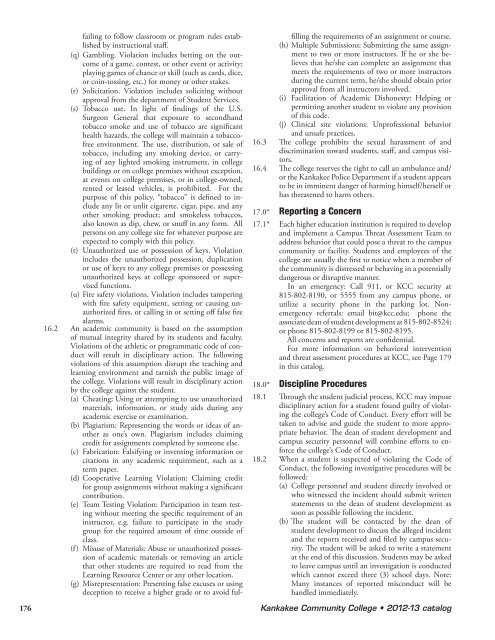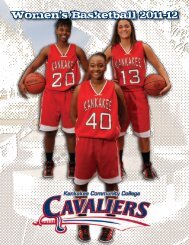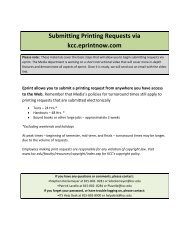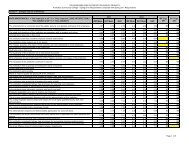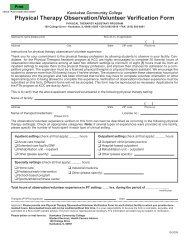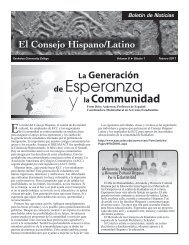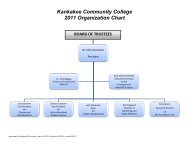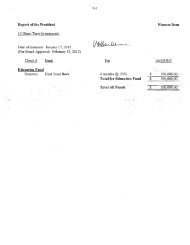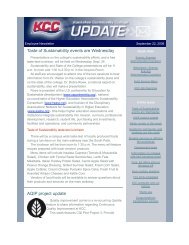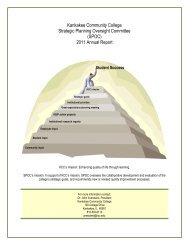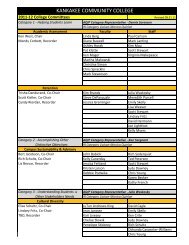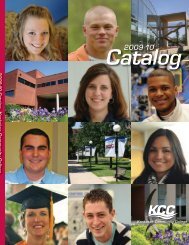Code of Campus Affairs & Regulations - Kankakee Community ...
Code of Campus Affairs & Regulations - Kankakee Community ...
Code of Campus Affairs & Regulations - Kankakee Community ...
Create successful ePaper yourself
Turn your PDF publications into a flip-book with our unique Google optimized e-Paper software.
failing to follow classroom or program rules established<br />
by instructional staff.<br />
(q) Gambling. Violation includes betting on the outcome<br />
<strong>of</strong> a game, contest, or other event or activity;<br />
playing games <strong>of</strong> chance or skill (such as cards, dice,<br />
or coin-tossing, etc.) for money or other stakes.<br />
(r) Solicitation. Violation includes soliciting without<br />
approval from the department <strong>of</strong> Student Services.<br />
(s) Tobacco use. In light <strong>of</strong> findings <strong>of</strong> the U.S.<br />
Surgeon General that exposure to secondhand<br />
tobacco smoke and use <strong>of</strong> tobacco are significant<br />
health hazards, the college will maintain a tobacc<strong>of</strong>ree<br />
environment. The use, distribution, or sale <strong>of</strong><br />
tobacco, including any smoking device, or carrying<br />
<strong>of</strong> any lighted smoking instrument, in college<br />
buildings or on college premises without exception,<br />
at events on college premises, or in college-owned,<br />
rented or leased vehicles, is prohibited. For the<br />
purpose <strong>of</strong> this policy, “tobacco” is defined to include<br />
any lit or unlit cigarette, cigar, pipe, and any<br />
other smoking product; and smokeless tobaccos,<br />
also known as dip, chew, or snuff in any form. All<br />
persons on any college site for whatever purpose are<br />
expected to comply with this policy.<br />
(t) Unauthorized use or possession <strong>of</strong> keys. Violation<br />
includes the unauthorized possession, duplication<br />
or use <strong>of</strong> keys to any college premises or possessing<br />
unauthorized keys at college sponsored or supervised<br />
functions.<br />
(u) Fire safety violations. Violation includes tampering<br />
with fire safety equipment, set ting or causing unauthorized<br />
fires, or calling in or setting <strong>of</strong>f false fire<br />
alarms.<br />
16.2 An academic community is based on the assumption<br />
<strong>of</strong> mutual integrity shared by its students and faculty.<br />
Violations <strong>of</strong> the athletic or programmatic code <strong>of</strong> conduct<br />
will result in disciplinary action. The following<br />
violations <strong>of</strong> this assumption disrupt the teaching and<br />
learning environment and tarnish the public image <strong>of</strong><br />
the college. Violations will result in disciplinary action<br />
by the college against the student.<br />
(a) Cheating: Using or attempting to use unauthorized<br />
materials, information, or study aids during any<br />
academic exercise or examination.<br />
(b) Plagiarism: Representing the words or ideas <strong>of</strong> another<br />
as one’s own. Plagiarism includes claiming<br />
credit for assignments completed by someone else.<br />
(c) Fabrication: Falsifying or inventing information or<br />
citations in any academic requirement, such as a<br />
term paper.<br />
(d) Cooperative Learning Violation: Claiming credit<br />
for group assignments without making a significant<br />
contribution.<br />
(e) Team Testing Violation: Participation in team testing<br />
without meeting the specific requirement <strong>of</strong> an<br />
instructor, e.g. failure to participate in the study<br />
group for the required amount <strong>of</strong> time outside <strong>of</strong><br />
class.<br />
(f) Misuse <strong>of</strong> Materials: Abuse or unauthorized possession<br />
<strong>of</strong> academic materials or removing an article<br />
that other students are required to read from the<br />
Learning Resource Center or any other location.<br />
(g) Misrepresentation: Presenting false excuses or using<br />
deception to receive a higher grade or to avoid fulfilling<br />
the requirements <strong>of</strong> an assignment or course.<br />
(h) Multiple Submissions: Submitting the same assignment<br />
to two or more instructors. If he or she believes<br />
that he/she can complete an assignment that<br />
meets the requirements <strong>of</strong> two or more instructors<br />
during the current term, he/she should obtain prior<br />
approval from all instructors involved.<br />
(i) Facilitation <strong>of</strong> Academic Dishonesty: Helping or<br />
permitting another student to violate any provision<br />
<strong>of</strong> this code.<br />
(j) Clinical site violations: Unpr<strong>of</strong>essional behavior<br />
and unsafe practices.<br />
16.3 The college prohibits the sexual harassment <strong>of</strong> and<br />
discrimination toward students, staff, and campus visitors.<br />
16.4 The college reserves the right to call an ambulance and/<br />
or the <strong>Kankakee</strong> Police Department if a student appears<br />
to be in imminent danger <strong>of</strong> harming himself/herself or<br />
has threatened to harm others.<br />
17.0* Reporting a Concern<br />
17.1* Each higher education institution is required to develop<br />
and implement a <strong>Campus</strong> Threat Assessment Team to<br />
address behavior that could pose a threat to the campus<br />
community or facility. Students and employees <strong>of</strong> the<br />
college are usually the first to notice when a member <strong>of</strong><br />
the community is distressed or behaving in a potentially<br />
dangerous or disruptive manner.<br />
In an emergency: Call 911, or KCC security at<br />
815-802-8190, or 5555 from any campus phone, or<br />
utilize a security phone in the parking lot. Nonemergency<br />
referrals: email bit@kcc.edu; phone the<br />
associate dean <strong>of</strong> student development at 815-802-8524;<br />
or phone 815-802-8199 or 815-802-8195.<br />
All concerns and reports are confidential.<br />
For more information on behavioral intervention<br />
and threat assessment procedures at KCC, see Page 179<br />
in this catalog.<br />
18.0* Discipline Procedures<br />
18.1 Through the student judicial process, KCC may impose<br />
disciplinary action for a student found guilty <strong>of</strong> violating<br />
the college’s <strong>Code</strong> <strong>of</strong> Conduct. Every effort will be<br />
taken to advise and guide the student to more appropriate<br />
behavior. The dean <strong>of</strong> student development and<br />
campus security personnel will combine efforts to enforce<br />
the college’s <strong>Code</strong> <strong>of</strong> Conduct.<br />
18.2 When a student is suspected <strong>of</strong> violating the <strong>Code</strong> <strong>of</strong><br />
Conduct, the following investigative procedures will be<br />
followed:<br />
(a) College personnel and student directly involved or<br />
who witnessed the incident should submit written<br />
statements to the dean <strong>of</strong> student development as<br />
soon as possible following the incident.<br />
(b) The student will be contacted by the dean <strong>of</strong><br />
student development to discuss the alleged incident<br />
and the reports received and filed by campus security.<br />
The student will be asked to write a statement<br />
at the end <strong>of</strong> this discussion. Students may be asked<br />
to leave campus until an investigation is conducted<br />
which cannot exceed three (3) school days. Note:<br />
Many instances <strong>of</strong> reported misconduct will be<br />
handled immediately.<br />
176 <strong>Kankakee</strong> <strong>Community</strong> College • 2012-13 catalog


